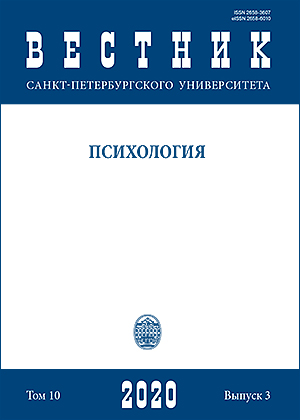Распознавание эмоций как маркер нарушений эмоциональной регуляции у лиц с химической зависимостью: обзор современных исследований
DOI:
https://doi.org/10.21638/spbu16.2020.310Аннотация
Теоретические модели аддиктивных расстройств рассматривают аддиктивное поведение как способ предотвращения или избегания негативного эмоционального состояния. Механизмы эмоциональной регуляции опосредуют влияние стрессоров на поведение человека, позволяя сформировать более или менее адаптивные поведенческие паттерны. Нарушения эмоциональной регуляции описаны при многих аддиктивных расстройствах и рассматриваются как многогранный конструкт, включающий в себя недостаточную осведомленность, понимание и принятие эмоций, неспособность контролировать поведение при эмоциональных переживаниях, отсутствие доступа к адаптивным стратегиям для изменения продолжительности или интенсивности отрицательных эмоциональных переживаний и нежелание испытывать эмоциональный стресс. Распознавание эмоций по лицевой экспрессии исключительно важно для способности формировать и поддерживать социальные связи, поскольку позволяет быстро (автоматически) декодировать эмоциональное состояние другого человека и адаптировать свое поведение относительно этих социальных сигналов. Фундаментальный вопрос о связи механизмов регуляции собственных эмоций и распознавания эмоций других людей по лицевой экспрессии до сих пор остается недостаточно изученным. Цель настоящего обзора — представить актуальные исследования в области изучения нарушений эмоциональной регуляции и распознавания эмоций у лиц с химическими зависимостями и определить связь между этими феноменами с дальнейшей оценкой значимости для прогноза и терапии зависимостей.
Ключевые слова:
распознавание эмоций, лицевая экспрессия, эмоциональная регуляция, эмоциональная дисрегуляция, зависимость от ПАВ, алкогольная зависимость
Скачивания
Библиографические ссылки
References
Загрузки
Опубликован
Как цитировать
Выпуск
Раздел
Лицензия
Статьи журнала «Вестник Санкт-Петербургского университета. Психология» находятся в открытом доступе и распространяются в соответствии с условиями Лицензионного Договора с Санкт-Петербургским государственным университетом, который бесплатно предоставляет авторам неограниченное распространение и самостоятельное архивирование.




